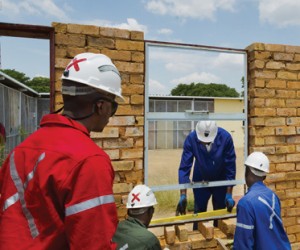With unemployment in South Africa at more than 36% something has to happen and happen soon. The South African approach in training has always been about ensuring that a trainee gets a job or at least is employable upon training. This is not only irrelevant but misleading in this century. Considering that above 60% of this unemployed are youth the situation is even worse.
It is common knowledge now in South Africa that unemployment is a race matter and this fact has a historical origin to the 1945 policy of segregation. The country is faced with a shocking reality of 30% black people unemployed, almost 24% of coloured people are unemployed, and 12% of Indians are unemployed while only 7.2% of white people in South Africa are unemployed. More than 85% of the unemployed are below the age of 35 which should be a worrying trend to all planners. This reality requires a critical shift both in minds and actions.
In order to deal with the realities of skills shortage the country needs to have a change heart and mind. The country cannot afford to continue to train for employability. Skills should be acquired for human survival. The training which is needed is for any average person to do basic things and repairs on their own. This will automatically translate into high number of artisans. People should learn to fix their own challenges. Every man or woman should know how to fix a leaking tap, change a bulb or a broken door.
Countries that are doing well in skills development train for different reason to those of South Africa. They (countries) train for people to solve problems in their own environment and circumstances. The focus should always be starting local. People need to be skilled so that they can solve problems in their own communities not with a view that there is a job somewhere in a different town or city. Engineers are needed so that they can design a bridge to cross that river in their neighbourhood and when there are enough engineers the village can then export some to the next village.
In South Africa it is always relevant to provide a historical context. After 20 years of democracy researchers and planner are rethinking development and the wealth creation principles. South Africa is going through several developmental stages depending on what perspective is adopted. The seventies have no doubt created a platform for youth uprising in the quest for a just society.
A society where all shall live freely and learn in the language of their choice. In the midst of these challenges attention was purely given towards human emancipation. The eighties has seen more mass mobilisation towards regime change followed by the nineties which was more on political change. The political power was indeed obtained and South Africa is free for all who live in it, black or white.
The next big fight will have to look at economic freedom. This has to be looked at outside the political space. It should be about individual economic emancipation. Researchers have shown in the past that when people work towards addressing the real problems facing the country, their neighbourhood’s money follows. Attention should be given towards ensuring that training focused on the existing problems is given a priority.
In the context of South Africa, it was supposed to be more visible and that skills training will focus in the main in the following sectors:
Manufacturing, tourism, industrialisation, construction (the whole built environment) including the plumbing, carpeting and mining activities, etc.
It is clear to me and all like minds out there that training should also move away from degree qualifications to short skills programmes. These will be your 4 months up to 18 months programmes.
Part of the reality in the unemployment situation is that people are holding degree qualifications which do not allow them to solve community problems and until such time that person gets a job this graduate is irrelevant in the community.
Training on short skills programmes is the easiest way through which sustainable wealth and job creation can be achieved. The focus has to shift from looking for a job into having survival skills. When people can survive their harsh realities it is easier for them to be more economically active and participate meaningfully in the economy of the country.






